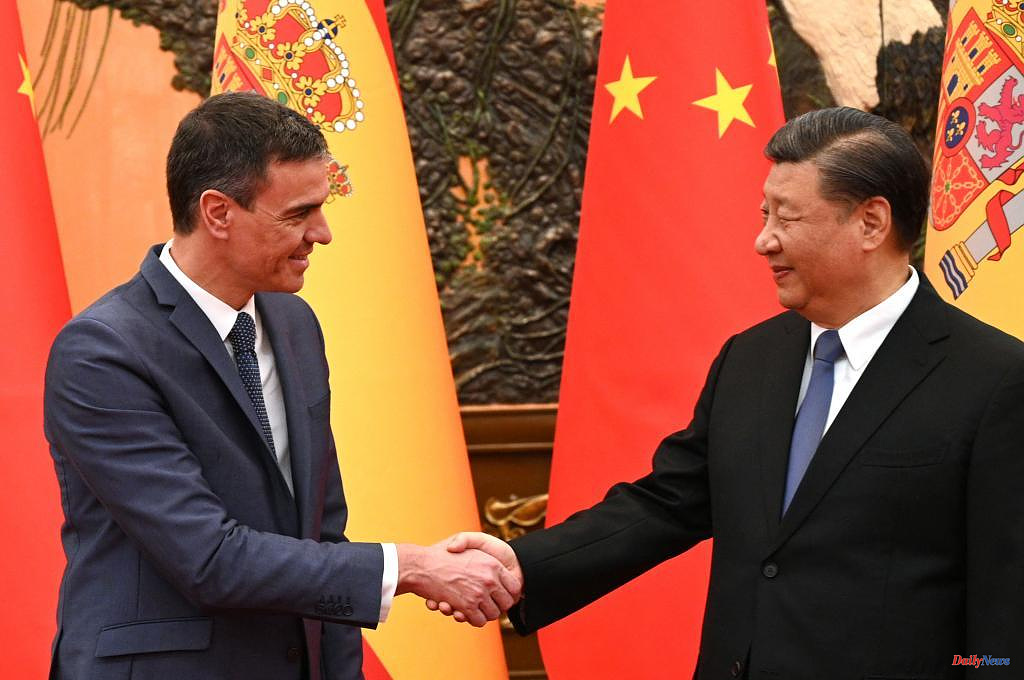Pedro Sánchez visiting Beijing, telling Xi Jinping, Vladimir Putin's most powerful friend, that we must bet on peace in Ukraine and respect the integrity of the attacked country. What did the president of the second world power answer? The same thing he always says to every leader who questions him on the matter: that China's position is to promote peace talks.
But the Chinese were not paying attention to what Xi and Sánchez were saying. What really worries them is that in Spain, their compatriots, the squatters are invading their homes. This is the playground of Mandarin social media.
It all started earlier this week on Weibo, the Chinese brother of Twitter, when the story circulated of a man named Yue Zhang, whose house in Barcelona had been squatted by a gypsy family, taking advantage of the fact that Yue had been trapped in China at the beginning of the pandemic and that he had not left his country in the last three years.
The hashtag "squatting Spain" was a trending topic with more than 30 million visits thanks to a video where some notes were given on how difficult it is in Spain to expel a squatter. Many users did not give credit. "Isn't Western private property inviolable? Tomorrow I can go to Spain on a trip and, if I feel like it, go into an empty house and stay there to live?" asked an Internet user.
In RedBook, similar to Instagram, they have also been taking out several videos for days in which Chinese citizens who have lived in Spain share their experiences: a doctor who had to stand guard one night and, when he returned home, he found a family there living; a businessman who bought a flat in Barcelona from China and, when he traveled to settle in, some squatters had even changed the lock.
The detachment in networks for the official visit of the Spanish president to Beijing has gone hand in hand with the Chinese media, who have given more hype to one of the viral topics of the week. "Spanish law allows the forced squatting of homes and the houses of the Chinese are squatted," read a headline in a local newspaper called Tiempos de Jinan. "A Chinese family did not return to Spain for three years and their house was squatted by gypsies," said another headline in the Henan Daily.
Regarding Sánchez's walk through the Great Hall of the People in Tiananmen, the mastodon Chinese hemicycle that has now become one of the epicenters of world diplomacy, the state channel CCTV has been the one who has taken the usual reading that the Chinese side usually makes of bilateral meetings, reserving for the last paragraph the reflection that Xi shared with Sánchez on the war in Ukraine:
"Xi Jinping stressed that China's position is to promote peace talks and political settlement. The Cold War mentality and confrontation should be abandoned, and sanctions and extreme pressure should be abandoned. The relevant parties are expected to can build a balanced, effective and sustainable European security architecture through dialogue and consultation".
Beijing, using its usual ambiguous newspeak, comes to say the same thing, even without changing a comma, as in so many other communiqués it has released in recent months: it calls for peace and presents itself as the great mediator of the conflict, while launching a dart to the United States, whom he accuses of dividing the world into blocks, like in the Cold War. He also opposes international sanctions against Russia and buys the Kremlin's narrative that there is a threat in NATO expansion in Eastern Europe.
The Chinese reading of the talk with Sánchez, who recalls a couple of times that this year marks the 50th anniversary of diplomatic relations between Spain and China ("They are two ancient civilizations and cultural powers with world influence," Xi described) also highlights the commitment of the Chinese president to "promote mutual cooperation with Spain and import more quality Spanish products".
In the section on the European Union, Xi said his country is willing to "carry out comprehensive dialogue and cooperation with the EU in the spirit of independence and mutual respect." All this while he waits for Spain to play an "active role in promoting China-EU dialogue and cooperation".
The coverage of the official Chinese media of the talk between Xi and Sánchez has been at the same level as that which the Chinese leader also had on Friday with the leaders of Singapore and Malaysia. A much muted following than he received, for example, from German Chancellor Olaf Scholz when he traveled to Beijing in November. Or even when, at the beginning of March, Putin's squire and Belarusian leader, Alexander Lukashenko, also visited the house of the new great helmsman, with whom everyone now wants to take a photo.
According to the criteria of The Trust Project












